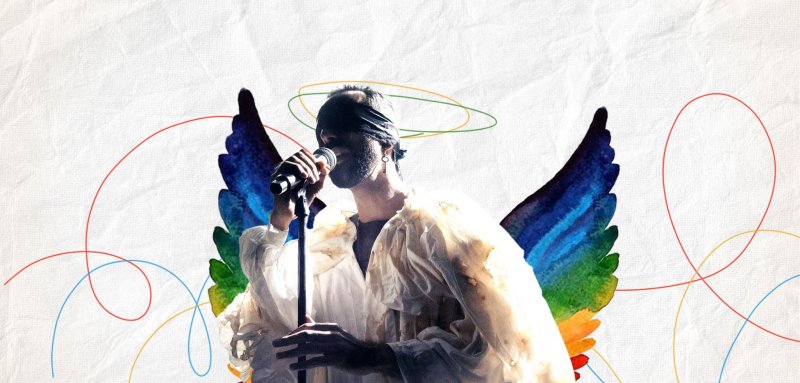Colored Stories: A dedicated space for vibrant stories belonging to individuals within the LGBTQIA+ community. These are stories of people who have overcome great challenges, shattered taboos, and left a strong mark in the public sphere or in the professional path they chose. Through their perseverance and effort, they have proven that success is not limited to sexual and gender identity, and that dreams are accessible to everyone without exception.
During the Israeli aggression against Gaza and Lebanon, which lasted for over a year, the positions of some Arab queer activists stood out, resonating both locally and globally.
The narrative of Palestinian queer influencers challenged Israel's narrative, which tried to portray its occupation as a "mercy" that saves members of the LGBTQIA+ community from the "hell" of their supposedly “extreme and savage” societies. However, the narrative of some queer influencers contradicted that of Israel, exposing the pinkwashing scam it uses to embellish and hide its true image as well as justify its actions, which resonated widely in both the Arab and Western worlds, revealing another side of the Arab queer struggle.
Bashar Murad asserts that Palestinians learn early on the harsh meanings of words like land invasion, siege, and prisons. "It's natural for this to create a desire for resistance and lay the foundation for all the creativity is being produced," he says.
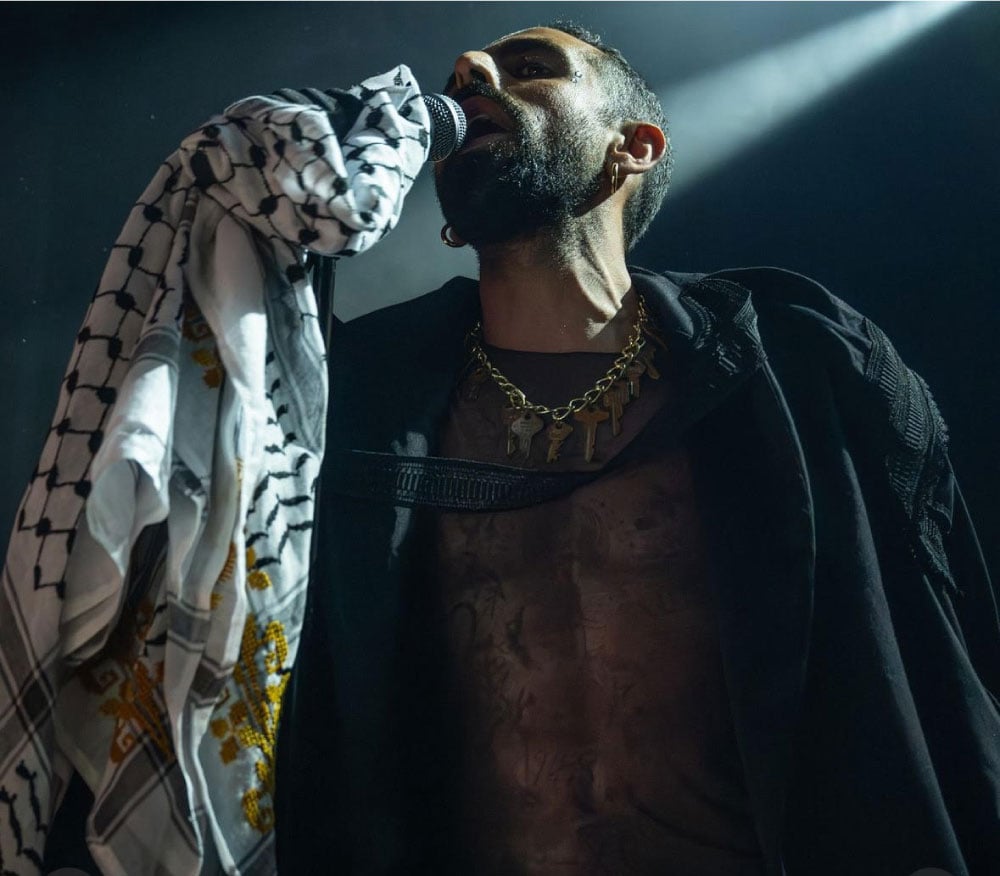 Palestinian artist Bashar Murad on stage
Palestinian artist Bashar Murad on stage
Palestinian artist Bashar Murad on stage
A colorful childhood
Bashar Murad, an artist and human rights activist, is one of the Arab influencers who continuously engage with human rights issues in the Arab world.
Born in 1993 in Jerusalem, Bashar is known not only for his art and humanitarian work but also for his advocacy for sexual minority rights and his consistent call for an end to the practices of the occupation in Palestinian territories.
Bashar tells Raseef22: "It has become important for me to mention where I was born because the world is trying to erase part of my identity and suppress my self-expression."
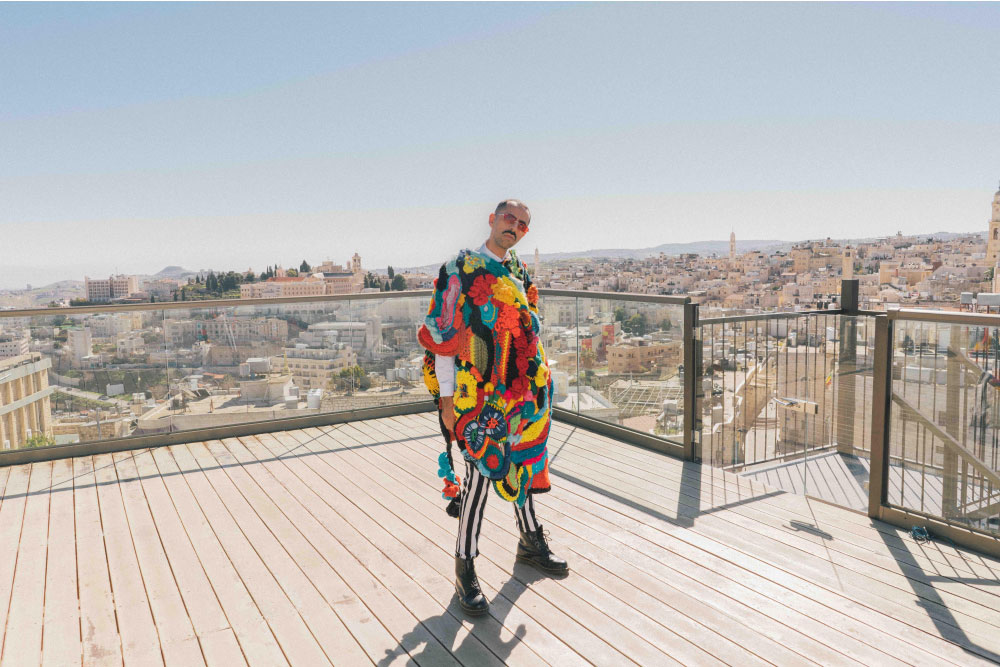 Palestinian artist Bashar Murad
Palestinian artist Bashar Murad
Bashar grew up with a strong sense of awareness between the theater and the studio in an artistic household. He is the son of Said Murad, the founder of the Sabreen band established in 1980 Jerusalem, which made music a medium for him to express himself and connect with the world.
"It has become important for me to mention where I was born because the world is trying to erase part of my identity and suppress my self-expression."
About his childhood, Murad says, "It was a colorful and beautiful childhood despite the challenges we faced from the occupation. I was influenced by Palestinian poets like Mahmoud Darwish, Hussein Barghouthi, Fadwa Tuqan, and many Palestinian and Arab writers and poets. All of this created in me an awareness of myself and my identity and made me hold on to them even more, and defend them."
Bashar moved to the United States to complete his university studies, where he was exposed to new experiences that allowed him to develope himself. He then returned to Jerusalem, carrying many dreams that he tried to implement during his work in Ramallah.
The love and desire for resistance
Bashar Murad describes his daily journey between his residence in Jerusalem and Ramallah as a school in itself, a true example of the occupation and its negative–and often dangerous–impacts: "The road that should have taken 15 minutes by car between Ramallah and Jerusalem now takes 120 minutes, or perhaps even more, due to the checkpoints and the inhuman practices of the occupation that steal our joys, our identity, and our lives, just as it steals our land."
"It's hard to imagine a future filled with light, plurality, and diversity while the occupation, which rejects diversity in all forms, creates a prison within an apartheid system, where genocide and ethnic cleansing are carried out before the eyes of the world."
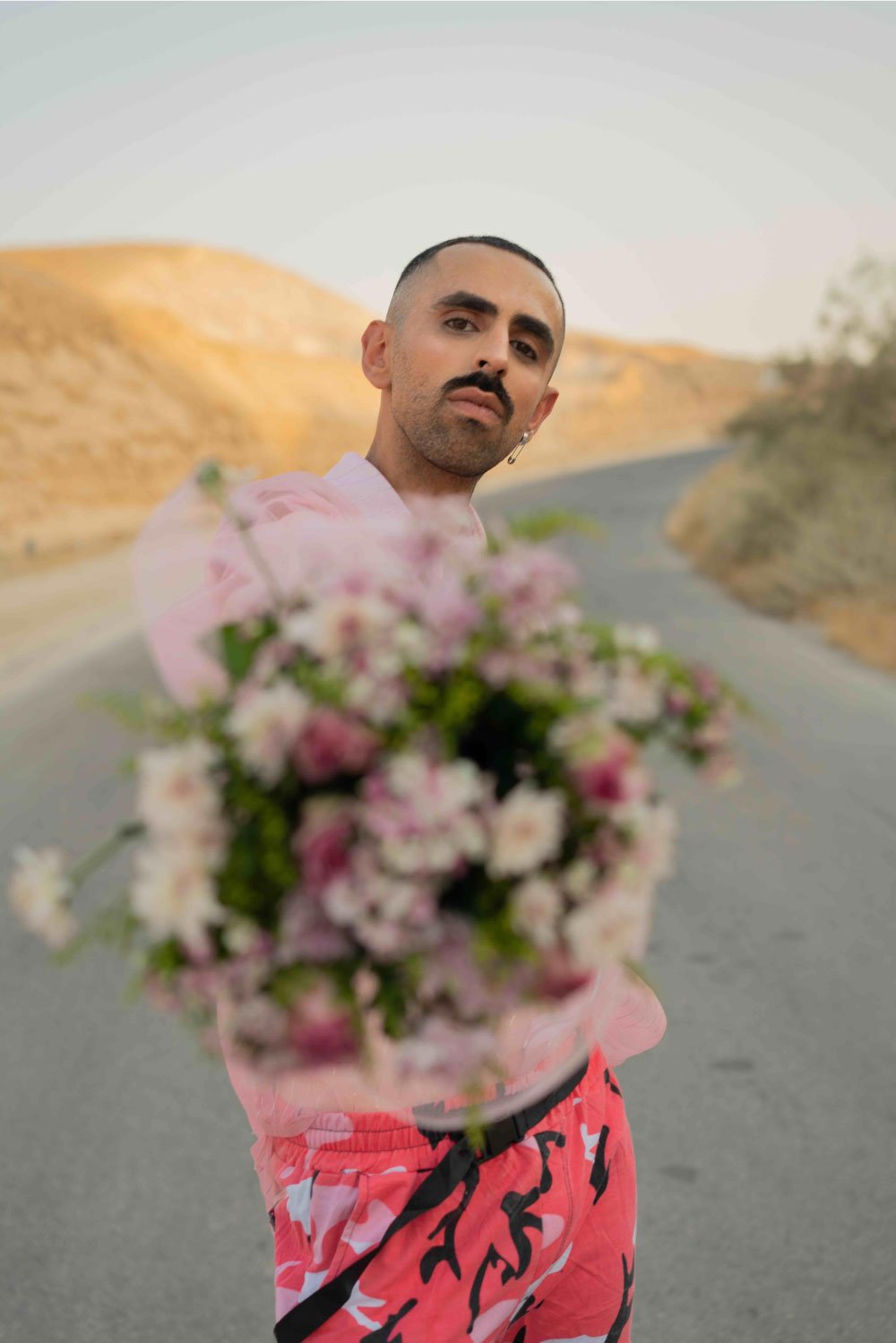 Palestinian music artist Bashar Murad
Palestinian music artist Bashar Murad
He emphasizes that the occupation is trying to suffocate the Palestinian people, trapping them behind high walls and barriers: "It's hard to imagine a future filled with light, plurality, and diversity while the occupation, which rejects diversity in all forms, creates a prison within an apartheid system, where genocide and ethnic cleansing are carried out before the eyes of the world." He asserts that Palestinians learn early on the harsh meanings of words like land invasion, siege, and prisons: "It's natural for this to create a desire for resistance and lay the foundation for all the creativity is being produced," he says.
Calls for freedom and peace
In addition to calling for justice and equality, Bashar’s songs carry many rejectionist terms, clearly attempting to resist the imposed reality and demand change. These songs also carry calls for freedom and peace in the world, without losing pride in personal and cultural traits, and pride in both collective and individual identity, with a strong presence of Palestinian symbols and names.
Some of his most notable songs in English include: Wild West, ITSAHELL!, and Intifada on the Dance Floor.
"The road that should have taken 15 minutes by car between Ramallah and Jerusalem now takes 120 minutes, or perhaps even more, due to the checkpoints and the inhuman practices of the occupation that steal our joys, our identity, and our lives, just as it steals our land."
Bashar links the Palestinian struggle with the global struggle for liberation, referring to the achievements of the American civil rights movement that challenged segregation and discrimination against African Americans, dismantling apartheid laws and promoting equal rights for African Americans. In this spirit, we hear him sing: "I Wish I Knew How It Would Feel to Be Free," which is the Arabic and English version of Nina Simone's 1967 song, sung by Bashar Murad.
His Arabic songs lean more toward the social side, and some of his most famous works include: Maskhara, Ana Zalameh, Shillet Hamal (Bunch of Bums), and Ma Bitghayirni.
In this context, Bashar says, "I reject any kind of injustice, and my songs are politically, socially, and emotionally diverse." He believes that his song Ilkul 3am Bitjawaz (Everyone is Getting Married) brought joy to many with its lyrics, reflecting their experiences. He describes this type of social art as resisting dominant societal norms, aiming for change and the protection of individual freedom, while respecting people’s privacy, inclinations, and choices without imposing pressure on them. "I learned the values of freedom from my family. I am a son of this diverse community, and I represent one of its stories and its colors."
In his music and lyrics, Bashar tackles concepts of identity, gender, and sexuality: "At a young age, I began exploring all these meanings. I loved things that were different from my peers, and my environment mostly consisted of girls. This made me realize my difference, which is why I create this music for the Bashar child who grew up different, without role models or heroes like him."
Bashar links the Palestinian struggle with the global struggle for liberation, referring to the achievements of the American civil rights movement that challenged segregation and discrimination against African Americans, dismantling apartheid laws and promoting equal rights for African Americans.
Self-expression
Bashar Murad speaks with pride about his sexual identity and his belonging to the LGBTIA+ community: "Being Palestinian and gay at the same time is an enriching factor that allows me to affirm both my national and sexual identities. The restrictions imposed by the occupation create a hunger for freedom and creativity. Additionally, the diversity within Palestinian society, with its various environments, circumstances, and identities, all contribute to the richness of the artistic production inspired by these different life experiences."
Bashar entered into a fierce competition, attempting to represent Iceland in the Eurovision contest, where he performed a song about the "Wild West." He also performed the song Hatari – Kelfi / Samed (Resilient) in collaboration with the Icelandic band Hatari, which gained fame in the Arab world after they raised the Palestinian flag at the Eurovision contest in Tel Aviv in 2019.
Bashar does not believe that everyone should like his work, but he emphasizes that he has a diverse audience in terms of age and gender/sexual identity: "The stage is where I express myself, where I feel my uniqueness and existence, my identity, and where I can communicate with others."
Bashar's stage presence seems unique in every detail: "Every part of my identity has given me strength and diversity. I know the road is difficult, but in the end, I try to say what I want and gain my freedom."
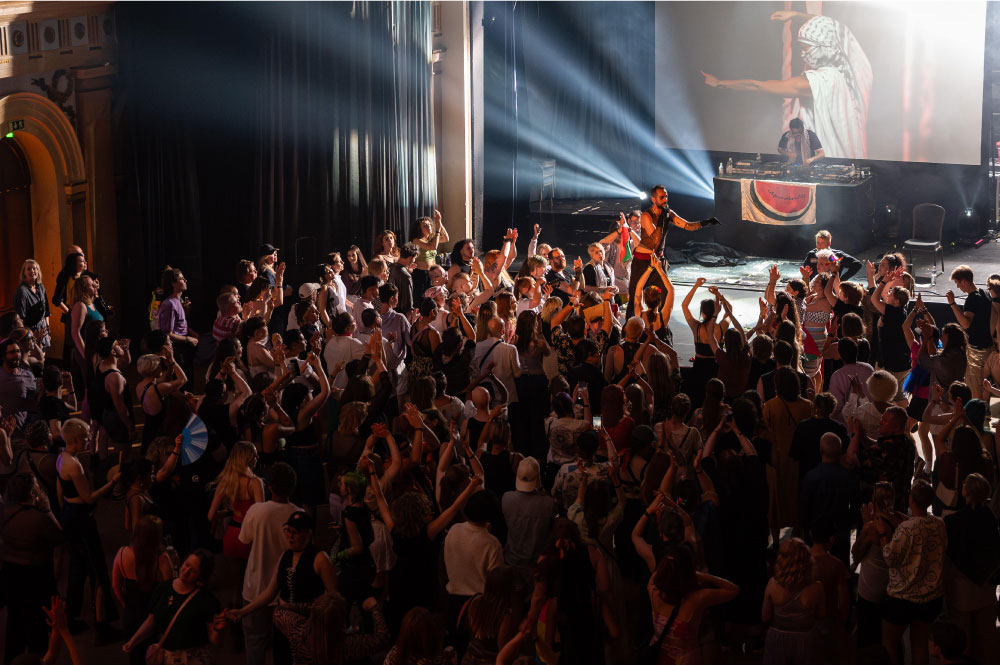 Palestinian artist Bashar Murad on stage
Palestinian artist Bashar Murad on stage
Palestinian artist Bashar Murad on stage
Bashar remains optimistic about the development of queer artistic experiences in the Arab world, noting that they have become more professional. However, he believes they still need time and effort to become more visible and sustained. He wishes for more empowerment and support for queer individuals to develop their talents and reach professionalism. At the same time, he encourages queer individuals to showcase their talents: "Each one of us plays a role in building this structure, so that it is completed in the end. Culture and collective awareness is a cumulative process."
"My childhood was a colorful and beautiful despite the challenges we faced from the occupation. I was influenced by Palestinian poets like Mahmoud Darwish, Hussein Barghouthi, Fadwa Tuqan, and many Palestinian and Arab writers and poets. All of this created in me an awareness of myself and my identity and made me hold on to them even more, and defend them."
Bashar describes himself as someone who loves challenges, and he is trying to pave a long artistic path with many achievements to accomplish, including holding concerts in the Arab world. He attempts to enter into different creative experiences and new ideas, diversifying his artistic work.
Alongside singing, writing lyrics and music, he also works in directing and modeling. He views this diversity as essential for any artist, enriching their ideas, career, and expanding their culture and awareness of the world around them: "What we do with all this cultural and artistic production is to affirm our diverse identities in the Arab world. We are young, interactive societies, and there are many resources and potentials, but we need time and experience to reach a free artistic space that accepts difference. Until we reach that, we present what we can and take a step forward on the path."
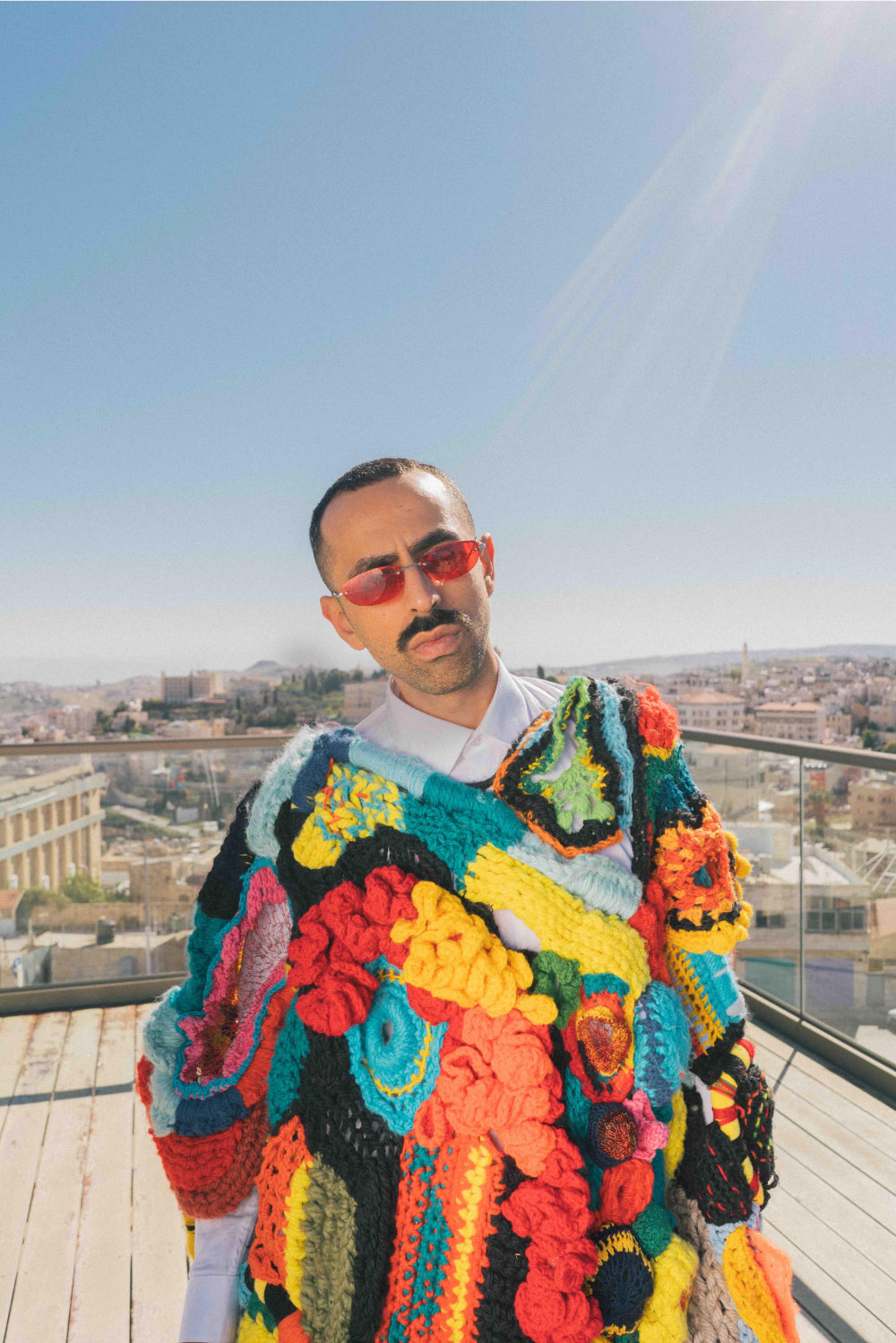 Palestinian artist Bashar Murad
Palestinian artist Bashar Murad
"I learned the values of freedom from my family. I am a son of this diverse community, and I represent one of its stories and its colors."
In the end, Bashar Murad emphasizes that seeing an end to the Israeli war crimes and genocide in Gaza is what he hopes for in the upcoming period, alongside his personal psychological development: "I hope to continue my artistic journey, to have space to develop my craft, and to have a greater ability to tell my story to the world. I also hope to increase the number of my fans, whom I consider my family."
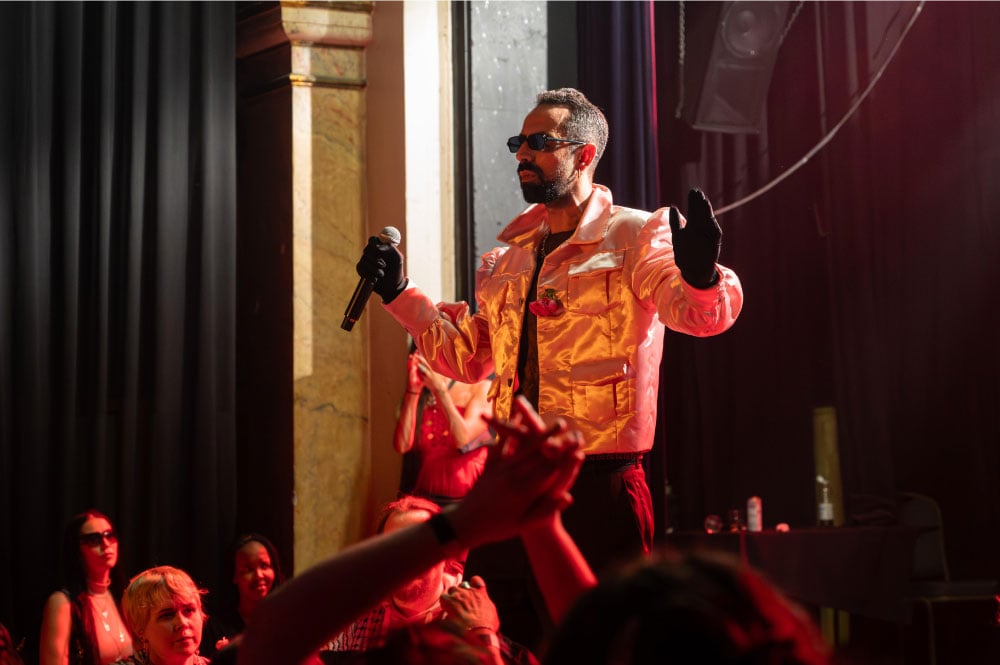 Palestinian artist Bashar Murad on stage
Palestinian artist Bashar Murad on stage
Raseef22 is a not for profit entity. Our focus is on quality journalism. Every contribution to the NasRaseef membership goes directly towards journalism production. We stand independent, not accepting corporate sponsorships, sponsored content or political funding.
Support our mission to keep Raseef22 available to all readers by clicking here!
Interested in writing with us? Check our pitch process here!
